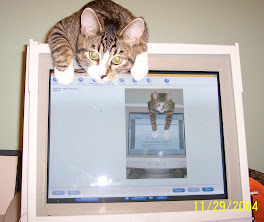Umm. Put the reviews here and just links to the side, perhaps? Yes, that should do nicely.
How to Hepburn: Lessons on Living from Kate the Great by Karen Karbo. (c) 2007, Bloomsbury USA, Biography
This little book came across my desk a couple of months ago and I was immediately smitten. Yes, Bringing Up Baby is one of my top five favorite movies of all time, and I spent a lot of time in college watching and ruminating on films by those iconic divas Hepburn, Garbo and Dietrich.
This book is not written with a particularly deferential air, and I'd like to think that Kate would have liked that. It's also not a filmography, nor a tell-all about the great actress' private life. Instead, it is a lively recitation of those characteristics of Hepburn that made her a remarkable character, both off-screen and on.
Chapters include: The importance of being brash, How to stick to your knitting, and Making the most of a dysfunctional relationship. I think even those who don't know much about Kate or haven't seen many of her movies would still enjoy this light read.
The anecdotes are brilliant. My favorite so far: One day Kate wore jeans onto the movie set, a move so outrageous that the powers-that-be sent a production assistant to take Hepburn's jeans while she was in the dressing room so that she would be "shamed" into wearing a skirt. Instead, Kate "traipsed around in her underwear until the jeans were returned."
Her brashness was not always appreciated. No, not even often. She was at times hated because her strong, androgynous, opinionated attitude went completely against what was expected of women, and women's film roles, of the time. Critics attacked her because she never looked convincing when the script called for her character to swoon into love. Karbo writes,
Long before Gloria Steinem observed that on some level all women are female impersonators, Hepburn was unwittingly showing it to be true. Hepburn did have a limited range, and the limit was acting insipid and submissive opposite a leading man who couldn't hold a candle to her. To make matters worse, Hepburn also managed to convey that she had other fish to fry, and there's nothing more dangerous than a woman who can't be brought to her knees by love.The allusion to Steinem notwithstanding, Hepburn was no feminist. Karbo refers to her as intransigently "nonanalytical," refusing to think deeply, or perhaps at all, about her impact on women's roles. She was prudish about sexuality on film and fiercely hostile to the notion of mothers working outside the home.
Karbo also points out an irony that I had learned years ago but forgotten: while women's roles in society have expanded, the roles on film have withered. Karbo lists the female roles for the top ten grossing films from the fall of 2006, a list that includes Bond girl, mothers, girlfriends, wives and ex-wives, assistants and a nanny. Not one is a leading role. However, in 1938 some of the greatest actresses of the time were starring in films, leading the plot as night-club dancer (Joan Crawford), office worker (Ginger Rogers) and more. The point is that, while expectations of gender-roles were limited (marriage is the ultimate role for a woman, love is the primary destination), the women were the headliners, not the pretty/pathetic/passive secondaries.
In spite of her brilliance, Katharine Hepburn nearly fell into obscurity. Karbo points out that the only reason Hepburn became famous was that she simply refused to give up. She kept breaking the mold until society caught up with her.
That's why I like Kate.





No comments:
Post a Comment